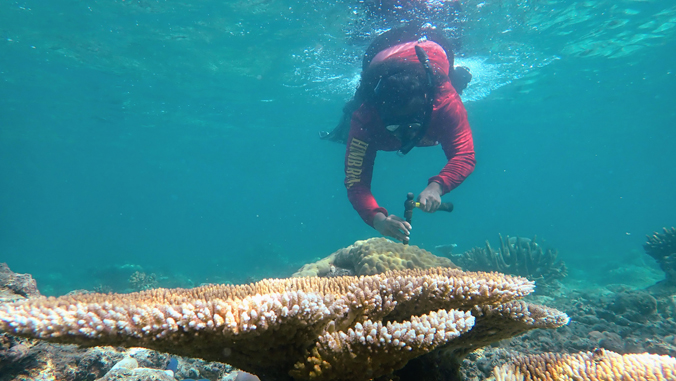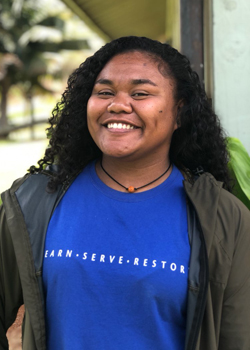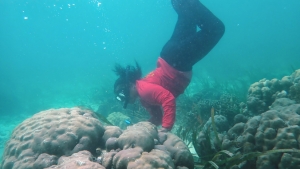
Palau is an island nation with strong ties to Hawaiʻi, a rich history of the application of traditional ecological knowledge to natural resource sustainability, and similar challenges tied to climate change, coral reef protection and fisheries management. Alexi Meltel, a second-year graduate student in the University of Hawaiʻi at Mānoa Marine Biology Graduate Program, recently traveled to Ngermid Bay, Palau to examine the protein and gene expression patterns of Porites lobata (lobe corals).
Ngermid Bay is a unique place to study corals because of its higher sea surface temperatures and reduced pH, which are predicted to affect most coral reefs by the year 2050 (or sooner) due to climate change. Despite these conditions, the bay still has very diverse coral communities.

Meltel is interested in determining if there’s a difference in the protein expression patterns of P. lobata between three sites within the bay when compared to populations of P. lobata from a reference site with more oceanic influences. Because protein expression can be used as a diagnostic tool for evaluating coral responses to different stressors, it is valuable for managers to know which proteins are being up- or down-regulated in these corals to allow them to live in highly stressful conditions encountered in Ngermid Bay.
“In addition to protein expression, I also want to know which particular genotypes make the populations of P. lobata within the bay so resilient, in comparison to populations from a reference site,” said Meltel. “During my trip to Palau, I collected tissue and skeleton samples from P. lobata colonies at the three sites within Ngermid Bay, and one site from outside.”
Connecting research across Pacific Islands
Cultural and research exchanges between Hawaiʻi and Palau have yielded positive outcomes in key areas such as ocean health, fisheries, adaptation to climate change and blending modern science with traditional practices.
“Conducting my research in Palau is important to me because I can contribute to the knowledge about Palau’s corals,” said Meltel. “Being able to do my research about my home island is also very gratifying for me because I feel like I’m doing my part to protect Palau’s oceans for future generations.”
Previous studies show that the corals in Ngermid Bay have locally adapted to their environment. With Meltel’s research, she hopes to identify what makes these corals so resilient, and how this information can be applied to enhancing reef resilience through active restoration activities, when needed.

“Lessons learned in Palau are broadly applicable to Hawaiʻi and other Pacific Islands,” said Robert Richmond, Meltel’s advisor at the Kewalo Marine Laboratory in Honolulu. “UH, as a U.S. flagship institution of higher education, plays an important role regionally, and students from the Pacific Islands add to UH’s efforts at strengthening diversity, equity and inclusion in the STEM disciplines that benefit all of our students. Lexi’s journey highlights the value of research programs and experiential learning as means of engaging students in STEM education.”
This work was done in collaboration with the Palau International Coral Reef Center.
This research is an example of UH Mānoa’s goal of Building a Sustainable and Resilient Campus Environment: Within the Global Sustainability and Climate Resilience Movement (PDF), Excellence in Research: Advancing the Research and Creative Work Enterprise (PDF) and Enhancing Student Success (PDF), three of four goals identified in the 2015–25 Strategic Plan (PDF), updated in December 2020.

